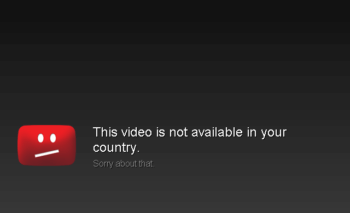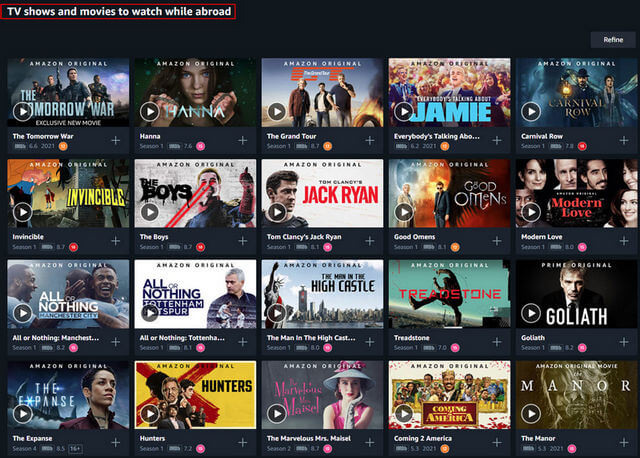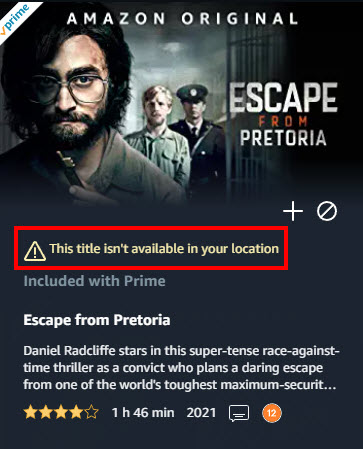This video is not available in your country. Sorry about that.
 Don’t you just hate it when that happens? But with YouTube this type of geoblocking, although common, is not across the board. It usually occurs if the video contains copyrighted material that is only licensed in certain countries and you just happen to live in a country where it isn’t licensed. In other streaming services such as Netflix and Prime Video, your location dictates the entire library of shows available to you. In many cases, the selection will be pruned back severely, leaving you with the dross that nobody else wants. If you didn’t already know, your IP address is the determining factor in the selection of shows available to you and it’s what I’ll be referring to later on.
Don’t you just hate it when that happens? But with YouTube this type of geoblocking, although common, is not across the board. It usually occurs if the video contains copyrighted material that is only licensed in certain countries and you just happen to live in a country where it isn’t licensed. In other streaming services such as Netflix and Prime Video, your location dictates the entire library of shows available to you. In many cases, the selection will be pruned back severely, leaving you with the dross that nobody else wants. If you didn’t already know, your IP address is the determining factor in the selection of shows available to you and it’s what I’ll be referring to later on.
Prime Video
Last year we subscribed to Prime Video and although we were charged in toilet paper Argentine pesos, the end-of-month credit card bill reconciliation had a US dollar conversion and so the Argentine government slapped a 65% tax on the final amount. I won’t bore readers with the finer details of this outrageous larceny, but suffice to say that I cancelled the subscription immediately on discovering the crime. Then, the other day I bought some bearings for my motorcycle through Amazon UK. The crucial point about this is that I used my UK debit card which can’t be pilfered by Argentine government thieves. Just before completing the transaction, I was offered a month’s trial of Prime Video and payments thereafter of £8 a month, so I accepted the offer expecting to be able to watch the entire Prime Video UK catalog of shows, films, and TV series. How wrong I was!
As you can see from the above image, if you are watching Prime in a different country from which you registered, you’ll be offered TV shows and movies to watch while abroad. But then if you scroll up to the other image in this section, you’ll see Watch anywhere, anytime, which in reality is not a true statement of fact at all. Lawyers of course will disagree and with clever legalese, definitions and acrobatic semantics would probably prove that anywhere doesn’t mean anywhere in the world. But the implication is already there, anywhere, anytime.
Clearly, I am aware of geoblocking and how it works, but the reality of its reach is quite shocking. On logging on to Prime, I found that about 85% of the content on offer spurned me with This title is not available in your location.
That’s rather annoying, or to put it into American, it’s a bummer! But it’s more than that really. It’s misleading, and many people, who may not be tech-savvy, will be confused by the mixed message of anytime, anywhere. So, what to do? Before we delve into that, let’s talk about the BBC.
The BBC License Fee
The British Broadcasting Corporation (aka, Auntie) has been around since radio (and later, television) entered our homes in the last century, in 1922 to be exact. It’s a public service broadcaster established by Royal Charter and funded by an annual license fee of £160 ($215) from households in the UK, plus a small amount of advertising revenue. The general programming of the BBC doesn’t include any advertisements at all, which for many is a major advantage, because we all know how nauseating ads can be. However, even if you have paid your license fee — the implication of which would suggest you have a right to watch BBC television anytime, anywhere — you can’t just swan along to the Costa del Sol, Manhattan, or Medellin and expect to sit back with a Daquiri and binge on your favourite shows. No siree!
For example, my brother, a fine, upstanding British citizen who pays his taxes and TV license fee, just happens to own a house in France which he likes to enjoy to its fullest extent, including online BBC television. But he can’t do that because he’s now watching Auntie in France and what with rights issues and all that bulls***, blah de blah. Naturally, he’s rather annoyed about this injustice, which he came across some years ago incidentally, so he uses a VPN (virtual private network) to bypass the geoblock. In fact, he was lucky enough to grab a lifetime subscription to a VPN for £15 a while back, so that’s what he uses with BBC iPlayer.
Are VPNs Legal?
There’s no easy answer to this question, except to say that they are legal in most democracies, with some exceptions, including, China, Russia, Belarus, Turkey, Iraq, UAE, Iran, Egypt, Turkmenistan, North Korea, and Uganda.
Uganda is an odd example as it attempted to block VPNs not for political or surveillance, but for more economical reasons. The country decided to tax users for using social media some years ago and citizens started using VPN service to bypass this regulation. The Ugandan government then instructed ISPs to block VPN users. Yet, many people continue to use VPNs in the country.
Many countries only allow you to use a government-run Intranet, so you’ll only see what they want you to see, but you can be sure that those who rule the country have free access to every damn website available.
But as usual, I digress. There are no laws preventing most of us from using a VPN, provided it’s not for nefarious purposes, ie. theft of copyrighted material and/or criminal activity. This is why millions of people turn to VPNs to receive the service they originally paid for, be that a license fee or a subscription.
In summary, I’m not here to recommend any particular VPN, suffice to say that the choice is up to you and there are literally hundreds to choose from. Having said that, Netflix and others are actively enforcing the blocking of VPNs and IP addresses and it’s become like a game of cat and mouse or a never-ending poacher and gamekeeper scenario with each side playing a never-ending game of catch-up. But geo-blocking is still a huge rip-off whichever way you look at it, enforced by the money-grabbing copyright holders.
—






Marc, seems like using a VPN to access Prime, is flagged and one is given this message, “Your device is connected to the Internet using a VPN or proxy service. Please disable it and try again”. I only tried the VPN on Prime, so maybe it might work with other streaming services. Must agree this policy is flawed, since it prevents travellers accessing their streaming services while on vacation, Mindblower!
Yeah many including Netflix will detect most VPNs and block them. I’ve tried to find a free VPN for Netflix but have so far been unsuccessful. Anyone found one?
Also legalities wise, while VPNs are not technically illegal in most countries, they often are against streaming sites terms and conditions. While nothing could happen, if detected, I presume they could technically cancel someone’s subscription. This is probably unlikely however, as they would lose a lot of users and so a lot of money
I hate the geoblocking on Youtube as well! One of my favorite Youtubers, Iohan Gueorguiev (RIP), has half of his videos blocked for music “in your country”. But turns out no VPN whatsoever will lift the geoblock. Logged in or not, doesn’t make a difference. It’s outrageous.
Regarding bypassing by VPN, allegedly a private IP from your VPN provider will help because it’s not on the blacklist. My VPN service Ivacy offers this as an optional service, with a monthly fee of course. And you have a to pick one country obviously. I didn’t try it so sadly I cannot give a judgement. Maybe worth a try! Sign up for one month, check with support up front if you can also test private IP.
Just tried Youtube for Iohan Gueorguiev, from Canada and USA using a free VPN, without any problems, Mindblower!